Photographs: Jason Reed/Reuters
"America cannot afford another so-called economic 'expansion', where the income of the average American household declined while the cost of health care and tuition reached record highs; where prosperity was built on a housing bubble and financial speculation," US President Barack Obama warned that both Asia and Europe were striving hard to surpass America in every sphere of life.
How long should America put its future on hold? he thundered.
In his first State of the Union address, Obama said: You see, Washington has been telling us to wait for decades, even as the problems have grown worse. Meanwhile, China's not waiting to revamp its economy. Germany's not waiting. India's not waiting. These nations aren't standing still. These nations aren't playing for second place. They're putting more emphasis on math and science. They're rebuilding their infrastructure. They are making serious investments in clean energy because they want those jobs.
Well I do not accept second-place for the United States of America. As hard as it may be, as uncomfortable and contentious as the debates may be, it's time to get serious about fixing the problems that are hampering our growth.
Blasting the lobbyists for trying to kill the financial reforms passed by the House, Obama warned that America cannot let them (lobbyists) win this fight. "And if the bill that ends up on my desk does not meet the test of real reform, I will send it back."
Excerpts from Obama's speech:
One year ago, I took office amid two wars, an economy rocked by severe recession, a financial system on the verge of collapse, and a government deeply in debt. Experts from across the political spectrum warned that if we did not act, we might face a second depression. So we acted - immediately and aggressively. And one year later, the worst of the storm has passed. further. . .'One in ten Americans still cannot find work'
Image: A crowd of onlookers are gathered outside the historic Federal Hall where US President Barack Obama was speaking in the heart of Wall Street in New York.Photographs: Larry Downing/Reuters
But the devastation remains. One in ten Americans still cannot find work. Many businesses have shuttered. Home values have declined. Small towns and rural communities have been hit especially hard. For those who had already known poverty, life has become that much harder.
This recession has also compounded the burdens that America's families have been dealing with for decades - the burden of working harder and longer for less; of being unable to save enough to retire or help kids with college.
So I know the anxieties that are out there right now. They're not new. These struggles are the reason I ran for President. These struggles are what I've witnessed for years in places like Elkhart, Indiana and Galesburg, Illinois. I hear about them in the letters that I read each night. The toughest to read are those written by children - asking why they have to move from their home, or when their mom or dad will be able to go back to work.
For these Americans and so many others, change has not come fast enough. Some are frustrated; some are angry. They don't understand why it seems like bad behavior on Wall Street is rewarded but hard work on Main Street isn't; or why Washington has been unable or unwilling to solve any of our problems.
They are tired of the partisanship and the shouting and the pettiness. They know we can't afford it. Not now. further. . .
'Both Democrats and Republicans hated bank bailout'
Image: Protesters march through New York's financial district during a rally against government bailouts.Photographs: Brendan McDermid/Reuters
Our most urgent task upon taking office was to shore up the same banks that helped cause this crisis. It was not easy to do. And if there's one thing that has unified Democrats and Republicans, it's that we all hated the bank bailout. I hated it. You hated it. It was about as popular as a root canal.
I supported the last administration's efforts to create the financial rescue program. And when we took the program over, we made it more transparent and accountable. As a result, the markets are now stabilized, and we have recovered most of the money we spent on the banks.
To recover the rest, I have proposed a fee on the biggest banks. I know Wall Street isn't keen on this idea, but if these firms can afford to hand out big bonuses again, they can afford a modest fee to pay back the taxpayers who rescued them in their time of need.
As we stabilised the financial system, we also took steps to get our economy growing again, save as many jobs as possible, and help Americans who had become unemployed.
That's why we extended or increased unemployment benefits for more than 18 million Americans; made health insurance 65 per cent cheaper for families who get their coverage through COBRA; and passed 25 different tax cuts. further. . .
'We cut taxes for 95 per cent of working families'
Image: U.S. President Barack Obama greets workers as he tours Allentown Metal Works in Allentown, Pennsylvania.Photographs: Jim Young/Reuters
Let me repeat: we cut taxes. We cut taxes for 95 per cent of working families. We cut taxes for small businesses.
We cut taxes for first-time homebuyers. We cut taxes for parents trying to care for their children. We cut taxes for 8 million Americans paying for college. As a result, millions of Americans had more to spend on gas, and food, and other necessities, all of which helped businesses keep more workers. And we haven't raised income taxes by a single dime on a single person. Not a single dime.
Because of the steps we took, there are about two million Americans working right now who would otherwise be unemployed. 200,000 work in construction and clean energy. 300,000 are teachers and other education workers.
Tens of thousands are cops, firefighters, correctional officers, and first responders. And we are on track to add another one and a half million jobs to this total by the end of the year.
The plan that has made all of this possible, from the tax cuts to the jobs, is the Recovery Act. That's right - the Recovery Act, also known as the Stimulus Bill. further. . .
'Jobs must be our number one focus in 2010'
Image: A family holds signs at a tea party protest on the grounds of the Colorado State capitol in DenverPhotographs: Rick Wilking/Reuters
And after two years of recession, the economy is growing again. Retirement funds have started to gain back some of their value. Businesses are beginning to invest again, and slowly some are starting to hire again.
But I realise that for every success story, there are other stories, of men and women who wake up with the anguish of not knowing where their next paycheck will come from; who send out resumes week after week and hear nothing in response. That is why jobs must be our number one focus in 2010, and that is why I am calling for a new jobs bill tonight.
Now, the true engine of job creation in this country will always be America's businesses. But government can create the conditions necessary for businesses to expand and hire more workers.
We should start where most new jobs do - in small businesses, companies that begin when an entrepreneur takes a chance on a dream, or a worker decides its time she became her own boss.
Through sheer grit and determination, these companies have weathered the recession and are ready to grow. But when you talk to small business owners you find out that even though banks on Wall Street are lending again, they are mostly lending to bigger companies. But financing remains difficult for small business owners across the country. further. . .
'It's time to finally slash the tax breaks for companies that ship our jobs overseas'
Image: The world's fastest train.Photographs: Reuters
I'm proposing that we take $30 billion of the money Wall Street banks have repaid and use it to help community banks give small businesses the credit they need to stay afloat.
While we're at it, let's also eliminate all capital gains taxes on small business investment; and provide a tax incentive for all businesses, large and small, to invest in new plants and equipment.
Next, we can put Americans to work today building the infrastructure of tomorrow. From the first railroads to the interstate highway system, our nation has always been built to compete. There's no reason Europe or China should have the fastest trains, or the new factories that manufacture clean energy products.
We should put more Americans to work building clean energy facilities, and give rebates to Americans who make their homes more energy efficient, which supports clean energy jobs.
And to encourage these and other businesses to stay within our borders, it's time to finally slash the tax breaks for companies that ship our jobs overseas and give those tax breaks to companies that create jobs in the United States of America.
But the truth is, these steps still won't make up for the seven million jobs we've lost over the last two years. The only way to move to full employment is to lay a new foundation for long-term economic growth, and finally address the problems that America's families have confronted for years. further. . .
'We need to encourage American innovation'
Image: Greenpeace activists wearing masks hold a carbon dioxide champions trophy.Photographs: Damir Sagolj/Reuters
Next, we need to encourage American innovation. Last year, we made the largest investment in basic research funding in history - an investment that could lead to the world's cheapest solar cells or treatment that kills cancer cells but leaves healthy ones untouched.
And no area is more ripe for such innovation than energy. You can see the results of last year's investment in clean energy - in the North Carolina company that will create 1200 jobs nationwide helping to make advanced batteries; or in the California business that will put 1,000 people to work making solar panels.
But to create more of these clean energy jobs, we need more production, more efficiency, more incentives. That means building a new generation of safe, clean nuclear power plants in this country.
It means making tough decisions about opening new offshore areas for oil and gas development. It means continued investment in advanced biofuels and clean coal technologies. And yes, it means passing a comprehensive energy and climate bill with incentives that will finally make clean energy the profitable kind of energy in America.
Stating that America needs to export more of its goods, Obama said, "because the more products we make and sell to other countries, the more jobs we support right here in America." further. . .
'We need to invest in the skills and education of our people'
Image: US President Barack Obama greets students at Graham Rd. Elementary School in Falls Church, Virginia.Photographs: Kevin Lamarque/Reuters
We have to seek new markets aggressively, just as our competitors are. If America sits on the sidelines while other nations sign trade deals, we will lose the chance to create jobs on our shores. But realising those benefits also means enforcing those agreements so our trading partners play by the rules. And that's why we will continue to shape a Doha trade agreement that opens global markets, and why we will strengthen our trade relations in Asia and with key partners like South Korea, Panama, and Colombia.
Obama also said that America needs to invest in the skills and education of its people.
Improving the education standard, cutting tuition fees, and revitalising the community colleges are some of the other reforms that Obama said his government will concentrate on.
"In the 21st century, one of the best anti-poverty programs is a world-class education. In this country, the success of our children cannot depend more on where they live than their potential."
To make college more affordable, Elementary and Secondary Education Act will finally end the unwarranted taxpayer-subsidies that go to banks for student loans. Instead, let's take that money and give families a $10,000 tax credit for four years of college. further. . .
'We are closer to bringing more security to the lives of Americans'
Image: Protestors wait outside the US Capitol.Photographs: Jim Young/Reuters
The steps we took last year to shore up the housing market have allowed millions of Americans to take out new loans and save an average of $1,500 on mortgage payments. This year, we will step up re-financing so that homeowners can move into more affordable mortgages.
Talking on healthcare, Obama said: I took on health care because of the stories I've heard from Americans with pre-existing conditions whose lives depend on getting coverage; patients who've been denied coverage; and families - even those with insurance - who are just one illness away from financial ruin.
After nearly a century of trying, we are closer than ever to bringing more security to the lives of so many Americans.
The President, however, acknowledged that, "this problem is not going away." More Americans will lose their health insurance. Our deficit will grow. Premiums will go up. Patients will be denied the care they need. Small business owners will continue to drop coverage altogether. I will not walk away from these Americans.

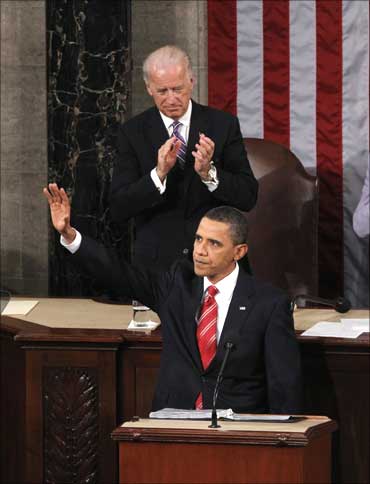
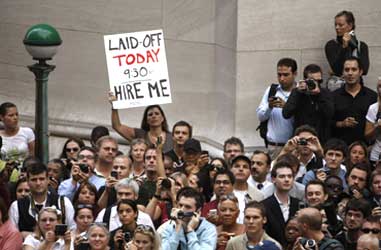
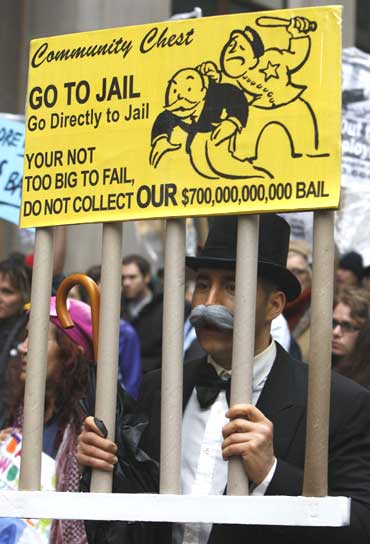
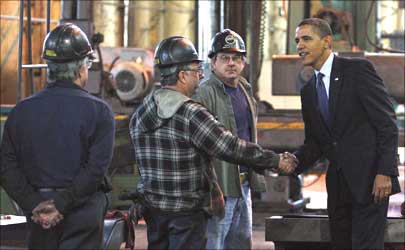
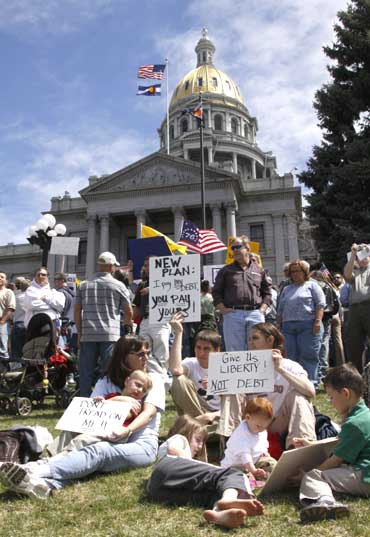
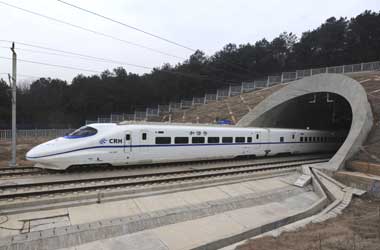

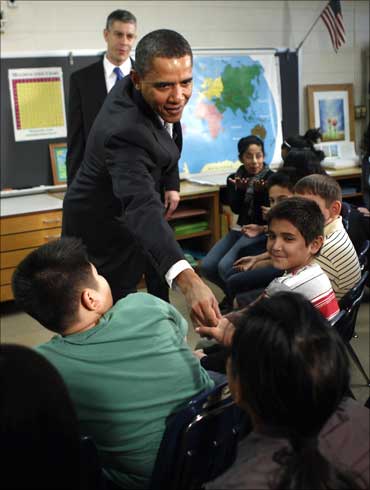
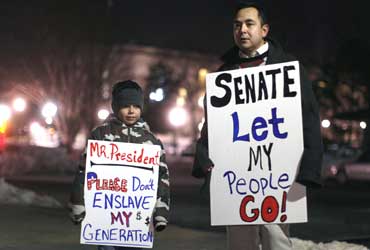
article